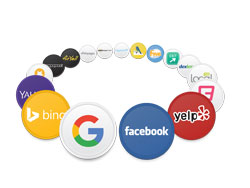8 Small Business SEO Essentials You Need to Understand
How You Can Compete With the Big Boys
 Large companies and national franchises have an obvious edge in search visibility over your small business. SEO can help overcome their advantages:
Large companies and national franchises have an obvious edge in search visibility over your small business. SEO can help overcome their advantages:
- They have thousands of inbound links giving them authority or importance on the web.
- They have a budget for SEO that probably far exceeds your own.
- Their websites have more pages and deeper content than you can afford to create.
- At least some of them are bound to have been around longer than your company has.
But that doesn’t have to stop you.
Small business SEO is no longer just about who’s been on the web longer, who has more pages on their website, or even who has the most links. It’s about which web page has the most relevance to what was searched and who has the best answer for the searcher’s question.
You can do this.
Here are eight things for you to understand and put in place on your small business’ website.
1) Focus on Quality Content
If you sell products, you need to go beyond the manufacturer’s stock product description that everyone has on their website. Add valuable information about how to choose the right product or what extra value you offer that makes your company the smart choice to buy from.
If you provide a service, explain your Unique Selling Proposition: what sets you apart from your run-of-the-mill competitor? What questions should a customer ask to tell if the company they’re considering is the best?
Provide extra value to the searcher in your content and you’ll be rewarded with higher rankings.
2) Backlinks are Essential
Your Link Profile — the number and quality of other sites that link to yours — is an essential tie-breaker for search rankings. Google doesn’t want to show lousy web sites on the first page, and the more other web sites think you’re good enough to link to, the better search engines assume you must be.

Relevance is also a factor: a site that’s related to you is a more valuable link than one that’s not. Links from sites in similar businesses or in the same Chamber of Commerce or professional association tend to count more than sites that aren’t.
If two web pages address a given search equally well, the one with a higher level of importance on the web will almost always outrank the other one.
[Update 1/4/2020:] The folks at T-Ranks have published a thorough article on How To Get Backlinks.
3) Don’t Try to Fool Google
So-called Black Hat SEOs have tried for years to fool Google into ranking small business websites higher than they deserve. And sometimes their tricks work — for a little while. But when Google catches them their clients suffer.
Don’t do it. It’s as simple as that.
4) Take Advantage of the Long Tail

The head portion represents the more generic searches people use: shoes, plumber, lawyer, restaurant.
The long tail portion represents more specific searches that aren’t searched nearly as often: women’s Muk Luk boots, plumber in Morristown NJ, criminal defense lawyer in San Diego, Mexican restaurant in Fargo.
Competition is much less for long tail keywords and the chance of your small business ranking well is vastly improved.
5) Leverage Local SEO
If you’re a local business that interacts with your customers on a face-to-face basis, you need to take advantage of Local SEO opportunities. Google recently explained how to improve your rankings for local search. The three main factors for local search rankings are:
- Relevance — how closely your content matches the searcher’s intent
- Distance — how local you are to the search being conducted
- Prominence — how widely known you are based on SEO rankings and information Google has on you from reviews, links, and listings in local directories, maps and apps.
You handle relevance through your normal SEO process of keyword selection and keyword-focused content. Distance requires that your pages include your address.
Prominence is a bit more challenging for a small business owner. There are dozens of directories and other locally-focused websites you need to be listed on. That brings us to the next item:
6) You Need Widespread and Consistent Citations

You need to make sure you’re listed correctly on as many of these sites as possible. We have a product called PowerListings that automates that for you and locks in your information. You can learn more about PowerListings here.
7) Achieve Freshness on Your Blog

Instead, host a blog on your site and write informative content for your target market at least monthly, Weekly may be better if you can manage it. That’s all the fresh content you need, and it provides you with an opportunity to share your blog posts on social media and an email newsletter.
8) The Value of Google+ and +1 Signals
You probably know that you need a Facebook page and perhaps a Twitter account. But lots of small businesses ignore Google+ and that’s a mistake. If you have a strong, active Google+ presence you’re likely to earn +1s. They’re similar to Facebook Likes. The folks at Moz noted that next to your web authority, the number of Google +1s is most highly correlated with great search rankings. In addition, links back to your web pages from Google+ carry more weight than links from Facebook and Twitter because they’re the only ones that convey actual PageRank value.
Update May 2019: Sad to say, Google+ never lived up to its potential and was discontinued as of October, 2019.
Rank Magic can help!
We’re the small business SEO experts.
We focus on what I call “small and very small businesses” and we address all eight of these factors and much more for our clients. We recognize that as a small business owner you have your hands full with running your business and have little time to spend paying attention to all of your marketing efforts.

 Large companies and national franchises have an obvious edge in search visibility over your small business. SEO can help overcome their advantages:
Large companies and national franchises have an obvious edge in search visibility over your small business. SEO can help overcome their advantages:




 It’s sad to say, but we see this all too often. An old website gets a facelift, and the new site looks great. But it’s not long before the website owner notices that they’re no longer getting any business from people finding them on the web. What happened?
It’s sad to say, but we see this all too often. An old website gets a facelift, and the new site looks great. But it’s not long before the website owner notices that they’re no longer getting any business from people finding them on the web. What happened? Relevance
Relevance

 Web sites suffering a significant loss of rankings as a result of the Penguin Update last spring have been scrambling to correct the factors that have hurt them. One main class of factors is
Web sites suffering a significant loss of rankings as a result of the Penguin Update last spring have been scrambling to correct the factors that have hurt them. One main class of factors is 


